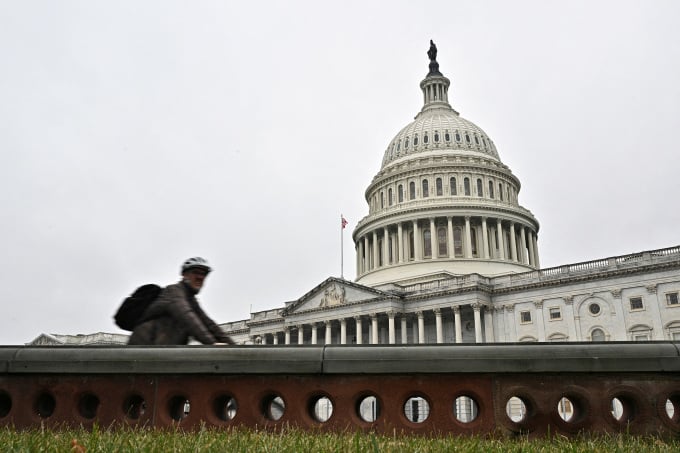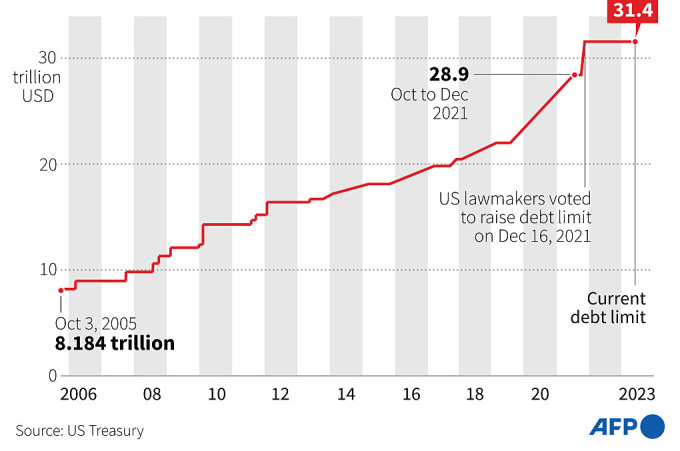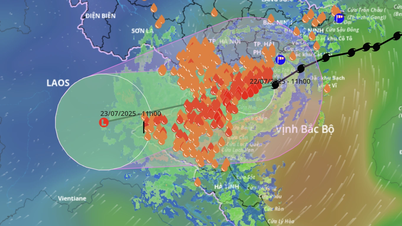Americans are about evenly split between accepting and opposing the country's first-ever default, according to a WSJ survey.
A recent Wall Street Journal poll found that 45% of Americans do not support Congress raising the debt ceiling. "I want them to stop printing money," said John Houck, 63, who lives near Phoenix. But he also doesn't want the United States to default.
Across the political spectrum, Republicans tend to be more skeptical, with three-quarters of Republicans opposing raising the debt ceiling, compared with 44% of the general public and 74% of Democrats.
Donna Good, a 70-year-old Democrat from Colorado, said the country must avoid default. If it does, she would blame the far-right wing of the Republican Party, as well as House Speaker Kevin McCarthy, for failing to quell the protests.
The political landscape is similar. The Republican-controlled House of Representatives is demanding spending cuts in exchange for agreeing to raise the debt ceiling. But Biden wants the House to agree without conditions. On May 9, congressional leaders from both parties gathered in the Oval Office with President Joe Biden for the first phase of negotiations. But that’s just the beginning of a long journey.
Also this week, Mr. Biden launched a new effort to rally Republican lawmakers in Democratic-dominated districts. On May 10, he sent a message to New York’s Hudson Valley, one of 18 Republican-controlled congressional districts.
"The debt ceiling is holding the economy hostage by threatening a literal, not figurative, national default," Biden said.

A cyclist passes the US Capitol building in Washington DC on January 3, 2023. Photo: Reuters
The inability of the United States to default on its government bonds has long been seen as a fundamental tenet of the global financial system. The country issues the world's reserve currency, so investors are always willing to lend to it.
Yet Washington is once again reminding the world that, through a politically charged hard measure called the debt ceiling – the total amount of government borrowing allowed – default is indeed possible, according to the Economist .
Occasionally, as in 2011, 2013, and now, the United States faces a debt ceiling that Congress must agree to or remove to avoid default. This time, the United States hit its $31.4 trillion borrowing limit in mid-January, forcing the Treasury to use temporary measures to pay off its debts as they come due.

Developments in US public debt. Unit: trillion USD. Graphics: AFP
According to Treasury Secretary Janet Yellen, these options will run out after June 1. Experts say that if the debt ceiling is not raised, leading to the country defaulting, it could push the economy into recession. Moody's Analytics predicts that a default would cost more than 7 million jobs and cause the unemployment rate to rise above 8%. The credit rating company also predicts a 20% loss in stock market capitalization.
Analysts at asset manager Pimco note that over the past decade, the S&P 500 has fallen an average of 6.5% in the month leading up to the debt ceiling. In 2013, during a debt-ceiling standoff, Federal Reserve officials calculated that a default within a month would cause the dollar to fall 10% and stocks to fall 30%.
The predicted impacts of a default are not small, but not all Americans agree with raising the debt ceiling. They also express some skepticism about the severity of a default.
Howard Brady, 56, a microfinance consultant in Seattle, thinks the nation’s credit rating will drop but only temporarily. Meanwhile, he thinks the White House could take additional steps to avoid default after June 1, including furloughing federal workers.
Christian Nascimento, 49, a Republican and CEO in Philadelphia, said he felt the U.S. had no choice but to raise the debt ceiling. But at the same time, he didn't think it was a mechanical solution: "We have to discuss government spending and how much we can sustain," he added.
Some are more optimistic. Lidia Cosme, a Chicago resident in her 60s, said the economy is down and will improve. So there is little urgency for the president to agree to deep budget cuts. “We are a strong country,” she said.
Despite the disagreements between politicians, the two parties will almost certainly find a way to avoid disaster for the country, the Economist argues. In the meantime, investors may have to accept a period of uncertainty. Mark Zandi, chief economist at Moody's Analytics, said there were some signs of emerging anxiety in financial markets, but that investors "seemed largely unfazed" by the June 1 deadline.
Normally, it is difficult to reach a decision overnight given the nature of American politics. It is also possible that the market will need to experience a panic to reach a deal.
“The longer it takes for financial markets to react, the more likely it is that lawmakers will not act in time, because market turmoil is probably what is needed to create the political will that lawmakers need to accept,” Zandi commented.
Default remains the least likely outcome. But as investors are becoming more acutely aware, it is no longer far-fetched, according to the Economist.
Phien An ( according to WSJ, The Economist, CNN )
Source link







































































































Comment (0)